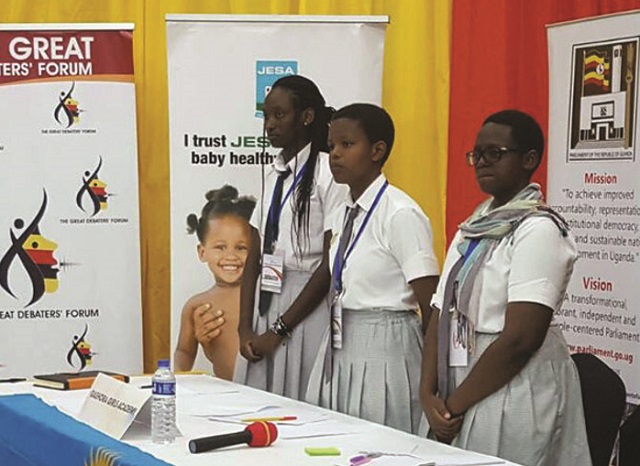
Spotlight on Rwanda’s school for underprivileged girls that shapes champions
| THE INDEPENDENT | When a team of young debaters from Rwanda’s Gashora Girls Academy of Science and Technology (GGAST) lifted the winner’s trophy at the inaugural Africa Debate Championships in Kampala on Sept.18, all attention shifted to how they do it.
Gashora’s win took many by surprise because Rwanda is not known to be strong at speaking English; the language of the debate. Also, these were girls; another usual handicap in the debating arena according to the stereo-type. Finally, these were science students; often taking pride only in calculating numbers and letting them speak.
So when Natasha Teta Semwanga scooped the Best Speaker accolade, Sylvie Mahoro Wairimu emerged best country speaker, and Nikitah Isabella emerged 3rd best speaker, the audience at the International Conference Centre in Kampala paid attention. They are all students of science course like physics, biology, chemistry, and of course the ubiquitous mathematics.
But here they were routing competition from Uganda, Tanzania, and South Sudan from the East African community and South Africa and Zimbabwe from the South, where English has a longer history of being spoken.
Gashora Girls Academy of Science and Technology (GGAST) is a private upper-secondary girls’ boarding school located in Bugesera District to the south of the capital city of Kigali. It has only been in operation for six years.
Unknown to the many people in the audience, Gashora Girls Academy, actually have a history of winning debates. The school, for example made history by being the first all-girls school to win Rwanda’s annual National Youth Entrepreneurs Debate Competition.
Part of the winning streak is a result of the school’s approach to teaching and learning.
Gashora admits students starting at Senior 4 for a three year course designed to start at the equivalent of the 10th Grade (Sophomore) in U.S. to the Senior year when they are about 17 to 18 years old and are ready to enter higher education; including vocational schools, colleges, and undergraduate university study.
Once in the school, the new S.4 students spend at least one week taking all our subjects before they select the combination they will study for three years.
Currently we offer the combinations which include physics, computer science, biology, mathematics, chemistry, engineering, and geography, according to the school website. But all students study English in addition to their combinations.They also have a strong tradition of debating and seminars.
The debating club has been the leading club in the school with almost 80% of the S4 students registered under this club. They are trained in eloquence and fluency, superb speaking, and other debate skills.
Soon, the girls who are enrolled from most of Rwanda’s 30 Districts and often include foreign students from say Burundi and Somaliland, are soon experts at thinking and analyse facts critically and speaking eloquently to convince listeners. Learning in a socio-economically diverse school could also be an advantage, according to the school.
The school is private and is affiliated to renowned international organisations like Microsoft, Segal Foundation, Newman’s Own Foundation and more.
According to the school, 100% of all students receive financial aid on a sliding scale depending on their family’s needs. Many of girls pay less than what they would pay if they attended a government school.
The school is part of the Rwanda Girls Initiative (RGI) was founded by Shalisan “Shal” Foster and Suzanne “Soozi” Sinegal McGill, with the vision of helping children for whom education is not easily accessible.
****
 The Independent Uganda: You get the Truth we Pay the Price
The Independent Uganda: You get the Truth we Pay the Price



